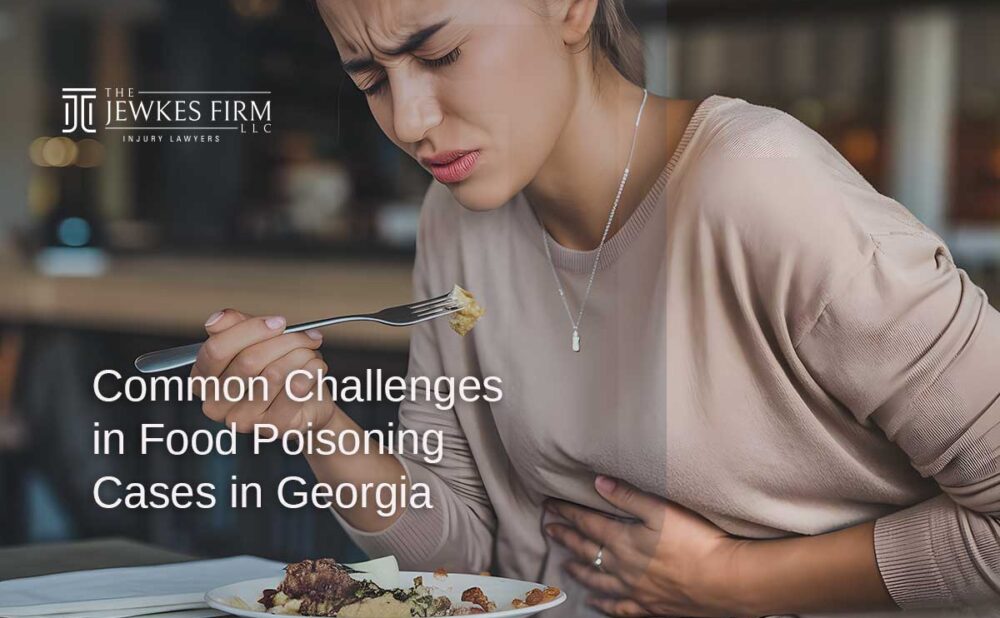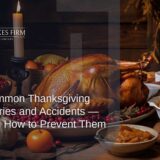Common Challenges in Food Poisoning Cases in Georgia
Food poisoning can be a serious and sometimes life-altering event, leading to severe health complications and significant financial burdens. When the food we trust to be safe causes harm, victims deserve justice and compensation. At The Jewkes Firm, Attorney Jordan Jewkes has extensive experience helping clients in Georgia navigate the complexities of food poisoning cases. In this article, we’ll explore the common challenges faced in food poisoning claims in Georgia and how we can help you overcome them.
Suffering from Food Poisoning? Contact Us For A Free Consultation
Suffering from Food Poisoning?
Understanding Food Poisoning and Its Legal Implications in Georgia
Food poisoning typically occurs when contaminated food causes illness due to bacteria, viruses, parasites, or toxins. Common culprits include Salmonella, E. coli, Listeria, and Norovirus. When food establishments, manufacturers, or distributors are negligent, injured parties have the right to pursue compensation for medical expenses, lost wages, pain and suffering, and more.
Pursuing a food poisoning claim in Georgia presents several difficulties, as these cases frequently do not have clear-cut evidence and may require an extended period to reach a resolution. Common challenges include:
Proving Causation and Source of Contamination
One of the biggest hurdles in a food poisoning lawsuit is proving that the defendant’s food product caused your illness. Food poisoning symptoms often overlap with other illnesses, making medical diagnosis alone insufficient to identify the contamination source. Additionally, it can be difficult to prove that a specific restaurant or product was responsible, especially when multiple people may have consumed similar food.
The law requires showing that the defendant’s conduct was a proximate cause of the harm. In the past, Georgia courts treated food‐poisoning cases as a special species of negligence cases, imposing a heavier burden on plaintiffs. Fortunately, the Georgia Supreme Court clarified in Patterson that the summary‑judgment standard for food‑poisoning cases is the same as for other negligence claims.
At The Jewkes Firm, we collaborate with medical professionals, epidemiologists, and food safety experts to establish a clear causal link between the defendant’s negligence and your illness.
Gathering Timely and Reliable Evidence
Food poisoning evidence deteriorates quickly. Providers may discard samples of contaminated food before an investigation begins, and victims may delay seeking medical attention. Time-sensitive evidence such as food remnants, receipts, witness statements, and health inspections are critical in building a strong case.
We prioritize swift action, immediately working to collect all relevant evidence to preserve your claim’s viability.
Regulatory and Statutory Framework in Georgia
Another layer of complexity comes from the interplay between regulatory standards (food safety codes, the Georgia Food Act) and civil claims. The Georgia Food Act (O.C.G.A. § 26‑2‑20 et seq.) provides statutory regulation of food safety, misbranding, adulteration and distribution of food. Civil claims can rely on violations of these statutes for support, but limited enforcement often occurs.
Private parties may still need to depend on traditional negligence or products liability theories for recovery. Georgia also has workers’ compensation nuances: for example, if the food poisoning occurred via an employer‐provided cafeteria, workers‐compensation might apply—but only in limited circumstances. In wrongful death situations due to food poisoning, families may have separate claims under Georgia’s wrongful death statutes.
Georgia law imposes strict time limits on when food poisoning claims can be filed. Generally, individuals must file personal injury claims, including those for foodborne illnesses, within two years from the date of injury. Missing this deadline often results in dismissal of your case regardless of the merits.
Our legal team keeps a keen eye on deadlines to ensure we file your case promptly, safeguarding your right to seek compensation.
Overcoming Defenses from Food Providers
Restaurants and food producers often employ strong legal defenses, including arguing that they handled the food properly, that the illness stemmed from another source, or that the victim contributed to their own illness (comparative negligence). Insurance companies also frequently undervalue claims or seek to deny liability altogether.
Attorney Jordan Jewkes and The Jewkes Firm’s experienced litigators vigorously advocate for our clients, challenging these defenses and striving for maximum recovery.
Handling Complex Medical Complications
Some food poisoning cases lead to severe complications such as kidney failure, neurological issues, or long-term digestive problems. These consequences require extensive medical documentation and expert testimony to demonstrate the extent of damages.
We work closely with healthcare professionals to fully document your injury and its impact on your life, ensuring your compensation reflects the true scope of harm.
Evaluating Damages — Proving Loss and Injuries
Not all cases of food poisoning lead to serious, long‐term injury. From a legal perspective in Georgia, the damages side can present challenges: unless the harm is substantial, the cost/benefit of pursuing a claim may limit you. Some victims recover in a few days with minimal expense; those cases may not warrant litigation. Proving more serious sequelae (such as kidney damage from E. coli, long‐term gastrointestinal damage, or death) requires expert medical testimony and linking that to the food consumption. Calculating lost wages: self-employed victims or those with irregular income can complicate proof. Non‐economic damages (pain, suffering, loss of enjoyment of life) are inherently subjective.
Outbreak vs Single‐Victim Cases
Whether the case involves a broad outbreak (many people falling ill from the same source) or a single‐victim scenario affects strategy and proof. Outbreak cases can strengthen causation because multiple people got sick, linking a common source. But they bring public‐health investigations, media attention and much larger defendants. Single‐victim cases may be harder to prove because there’s no obvious “cluster” of illnesses; they rely heavily on individual documentation and traceability. In Georgia, courts have historically been skeptical of food‐poisoning claims without strong causation evidence; the recent Patterson decision helps, but the challenge remains.
Settlement vs Trial Strategy
Given the complexity and cost of litigating food‐poisoning cases, many end in settlement—but clients must be well‐informed about risks, timelines and what is reasonable. Some cases settle early when the evidence is strong (e.g., documented pathogen match, multiple victims, clear link). Others may require full litigation; adjusting expectations accordingly is important. Adjusters will attempt to undervalue or deny claims, especially if the illness was short‐lived or documentation is incomplete. Trial may be financially and emotionally burdensome, so a thoughtful strategy is critical.
Client Communication and Managing Expectations
Food‑poisoning cases often involve anxiety, illness, downtime from work, medical bills and sometimes significant recovery time. Clear communication is essential. Clients may expect an easy “food‐poisoning lawsuit” with quick payout; in reality, the timeline can be long, and proof requirements rigorous. Some may recover quickly, but others may face lingering complications—explaining this variability is key. Address emotional/psychological effects (trauma, embarrassment, fear of eating out again). Clients often appreciate guidance on how to document their symptoms, hold onto records, photograph food or packaging, write down when they ate, when symptoms began, etc.

GEORGIA PERSONAL INJURY LAWYER NEAR ME
Why Choosing The Jewkes Firm Matters
When you face a food‑poisoning injury in Georgia, complex science, aggressive corporate defendants, supply chains and food‑safety systems often oppose you. At The Jewkes Firm, Attorney Jordan Jewkes understands the physical, emotional, and financial challenges posed by food poisoning. We offer:
- Free Case Evaluations. To assess the strength of your claim and guide your next steps.
- Experienced Investigation. Prompt, thorough evidence collection with trusted experts.
- Aggressive Representation. Skilled negotiation and litigation to hold negligent parties accountable.
- Client-Centered Approach. Compassionate support focused on your recovery and justice.
If you or a loved one became ill after eating food that you reasonably expected to be safe—whether at a restaurant, catered event, grocery store or other venue—don’t wait. The sooner you preserve evidence and begin investigation, the stronger your position becomes. Contact The Jewkes Firm, LLC at (770) 771-5130 for your free consultation.
Frequently Asked Questions
What makes food poisoning cases difficult to prove in Georgia?
Linking a specific food source to the illness is often challenging because symptoms overlap with other conditions. Evidence, like food samples, may no longer exist by the time someone files a claim.
What are the common challenges in food poisoning lawsuits in Georgia?
Food poisoning lawsuits in Georgia face several challenges, including identifying the responsible party, proving causation, handling limited evidence (like discarded food), and navigating Georgia's food safety regulations. It’s also critical to act quickly to preserve evidence before it disappears.
How do I prove food poisoning in a legal case?
To prove food poisoning, you must establish a link between the food you consumed and your illness. This often requires medical documentation, lab tests, witness statements, and evidence like food packaging or leftovers. Our team works with experts to strengthen your case and prove causation.
Who can be held liable for food poisoning in Georgia?
Potentially liable parties include the restaurant, caterer, food manufacturer, or distributor. Courts can base liability on negligence, product defects, or violations of the Georgia Food Act. It’s essential to investigate the supply chain to determine the responsible party.
Can I sue a restaurant or food manufacturer for my food poisoning?
Yes. If negligence by a restaurant, manufacturer, or distributor caused your illness, you may have grounds for a personal injury claim to recover damages.




